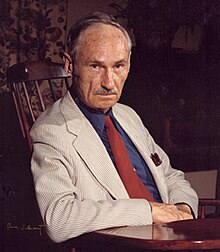Richmond Lattimore
This article needs additional citations for verification. (August 2017) (Learn how and when to remove this template message) |
Richmond Lattimore | |
|---|---|
 | |
| Born | May 6, 1906 |
| Died | February 26, 1984 (aged 77) |
| Nationality | American |
| Alma mater | Dartmouth College, Christ Church, Oxford, University of Illinois at Urbana-Champaign |
| Occupation | Professor |
| Known for | Translations of Greek classics |
| Spouse(s) | Alice Bockstahler |
Richmond Alexander Lattimore (May 6, 1906 – February 26, 1984) was an American poet and classicist known for his translations of the Greek classics, especially his versions of the Iliad and Odyssey.
Early life and career[edit]
Born to David and Margaret Barnes Lattimore in Paotingfu, China, he graduated from Dartmouth College in 1926. His brother Owen Lattimore was a Sinologist who was blacklisted for his association with China during the McCarthy era, but subsequently rehabilitated when none of the charges against him proved to be true. Their sister Eleanor Frances Lattimore was an author and illustrator of children's books.
Richmond was a Rhodes Scholar at Christ Church, Oxford, and received his B.A. in 1932, and subsequently, under the direction of William Abbott Oldfather, received a Ph.D. from the University of Illinois in 1934. He joined the Department of Greek at Bryn Mawr College the following year, and married Alice Bockstahler, with whom he later had two sons, Steven and Alexander; Steven also became a classical scholar and professor at UCLA.[1]
From 1943 to 1946, Lattimore was absent from his professorial post to serve in the United States Navy, but returned after the war to remain at Bryn Mawr College, with periodic visiting positions at other universities, until his retirement in 1971. He continued to publish poems and translations for the remainder of his life, with two poems appearing in print posthumously.
He translated the Revelation of John in 1962. A 1979 edition by McGraw-Hill Ryerson included the four Gospels. Lattimore completed translating the New Testament, which was published posthumously in 1996 with the title The New Testament.
Shortly before his death, he converted to the Catholic Church, due in part to his work translating the Gospel of St. Luke.[2]
Memberships[edit]
Lattimore was a Fellow of the Academy of American Poets, and a member of Phi Beta Kappa, the National Institute of Arts and Letters, the American Academy of Arts and Sciences, the American Philosophical Society, the American Philological Association, and the Archaeological Institute of America, as well as a Fellow of the American Academy at Rome and an Honorary Student at Christ Church, Oxford.
Books[edit]
Translations[edit]
- The Odes of Pindar. Chicago: University of Chicago Press, 1947.
- The Iliad of Homer. Chicago: University of Chicago Press, 1951.
- The Frogs. Ann Arbor: University of Michigan Press, 1962.
- The Odyssey of Homer. New York: Harper & Row, 1967.
- The Four Gospels and the Revelation, Newly Translated from the Greek. New York: Farrar Straus Giroux, 1979.
- Acts and Letters of the Apostles, Newly Translated from the Greek. New York: Farrar Straus Giroux, 1982.
- The Works and Days; Theogony; The Shield of Herakles. Ann Arbor: University of Michigan Press, 1991.
- The New Testament. New York: Farrar Straus Giroux, 1996.
Poetry[edit]
- The Stride of Time. Ann Arbor: University of Michigan Press, 1966.
- Poems from Three Decades. New York: Charles Scribner's Sons, 1972.
Awards[edit]
Lattimore's translation of Aristophanes' The Frogs won the Bollingen Poetry Translation Prize in 1962.
See also[edit]
References and sources[edit]
- References
- ^ S. Lattimore's translation of Thucydides was published in 1998 by Hackett.
- ^ "Richmond Lattimore - Crisis Magazine". Crisis Magazine. 2008-05-19. Retrieved 2018-03-09.
- Sources
- Deborah E. Kamen. "Lattimore". Department of Greek, Latin and Classical Studies. Bryn Mawr College. Archived from the original on March 7, 2008. Retrieved September 19, 2009.
External links[edit]
- Richmond Lattimore at the Database of Classical Scholars
- Richmond Lattimore a brief bio from the Poetry Foundation with online poems
- 1906 births
- 1984 deaths
- Greek–English translators
- Dartmouth College alumni
- Translators of the Bible into English
- American Roman Catholics
- 20th-century American poets
- 20th-century translators
- University of Illinois at Urbana–Champaign alumni
- Alumni of Christ Church, Oxford
- Bryn Mawr College faculty
- Translators of Homer